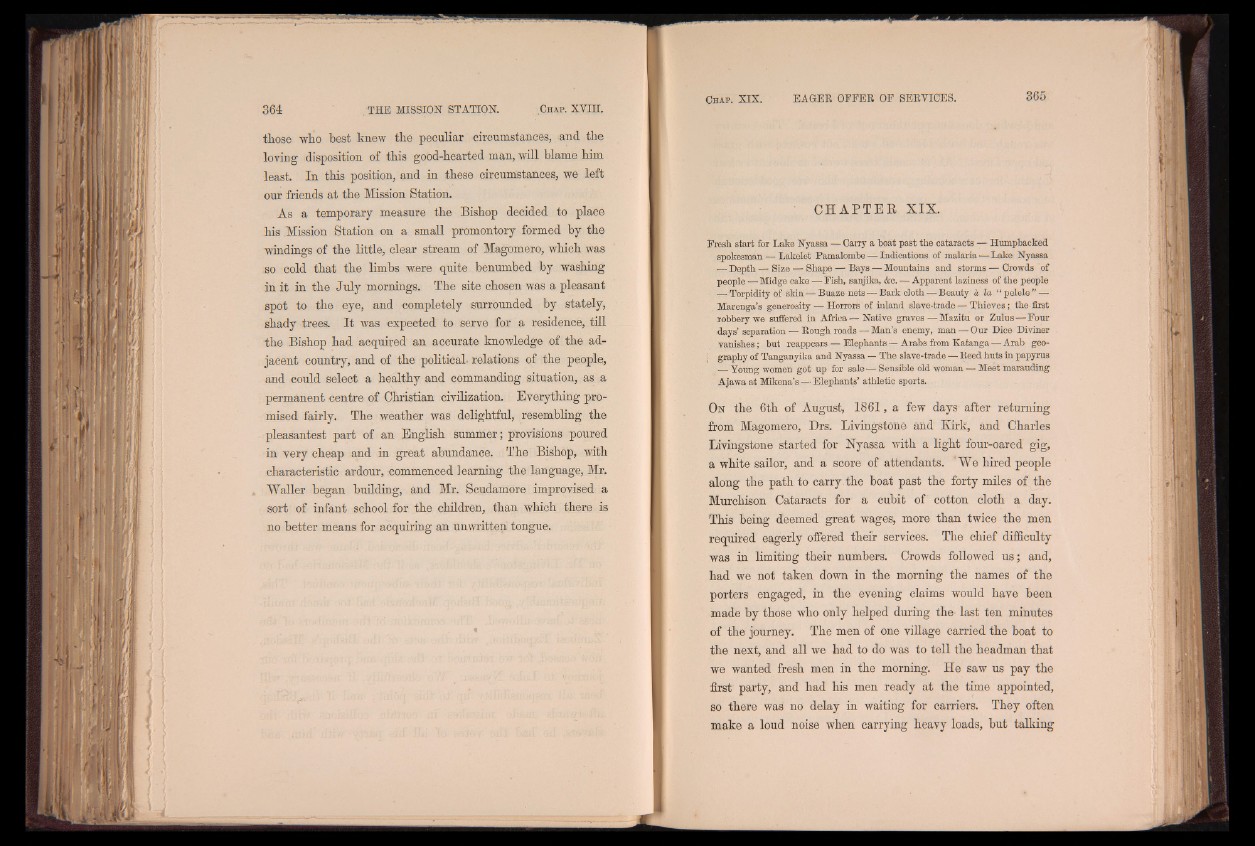
those who best knew the peculiar circumstances, and the
loving disposition of this good-hearted man, will blame him
least. In this position, and in these circumstances, we left
our friends at the Mission Station.
As a temporary measure the Bishop decided to place
his Mission Station on a small promontory formed by the
windings of the little, clear stream of Magomero, which was
so cold that the limbs were quite benumbed by washing
in it in the July mornings. The site chosen was a pleasant
spot to the eye, and completely surrounded by stately,
shady trees. I t was expected to serve for a residence, till
the Bishop had acquired an accurate knowledge of the adjacent
country, and of the political, relations of the people,
and could select a healthy and commanding situation, as a
permanent centre of Christian civilization. Everything promised
fairly. The weather was delightful, resembling the
pleasantest part of an English summer; provisions poured
in very cheap and in great abundance. The Bishop, with
characteristic ardour, commenced learning the language, Mr.
Waller began building, and Mr. Scudamore improvised a
sort of infant school for the children, than which there is
no better means for acquiring an unwritten tongue.
C H A P T E R X IX .
presh start for Lake Nyassa — Carry a boat past the cataracts — Humpbacked
spokesman — Lakelet Pamalombe — Indications, of malaria—Lake Nyassa
— Depth — Size — Shape — Bays — Mountains and storms — Crowds of
people — Midge cake — Pish, sanjika, &c. — Apparent laziness of the people
— Torpidity of skin — Buaze nets — Bark doth — Beauty a la “ pelele” —
Marenga’s generosity — Horrors of inland slave-tradeijl Thieves; the-first
robbery we suffered in Africa— Native graves—Mazitu or Zulus—Pour
days’ separation — Rough roads — Man’s enemy, man — Our Dice Diviner
vanishes; but reappears — Elephants — Arabs from Katanga — Arab geo-
| graphy of Tanganyika and Nyassapj The slave-trade — Reed huts in papyrus
— Young women got up for sale — Sensible old woman — Meet marauding
Ajawa at Mikena’s — Elephants’ athletic sports.
On the 6th of August, 1861, a few days after returning
from Magomero, Drs. Livingstone and Kirk, and Charles
Livingstone started for Nyassa with a light four-oared gig,
a white sailor, and a score of attendants. 'We hired people
along the path to carry the boat past the forty miles of the
Murchison Cataracts for a cubit of cotton cloth a day.
This being deemed great wages, more than twice the men
required eagerly offered their services. The chief difficulty
was in limiting their numbers. Crowds followed u s ; and,
had we not taken down in the morning the names of the
porters engaged, in the evening claims would have been
made by those who only helped during the last ten minutes
of the journey. The men of one village carried the boat to
the next, and all we had to do was to tell the headman that
we wanted fresh men in the morning. He saw us pay the
first party, and had his men ready at the time appointed,
so there was no delay in waiting for carriers. They often
make a loud noise when carrying heavy loads, but talking